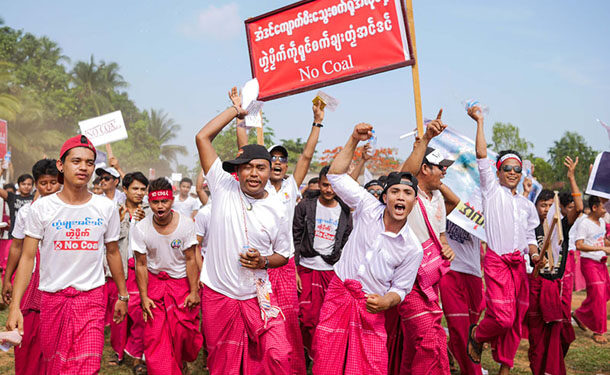RANGOON — Ministry of Electric Power Deputy Minister Aung Than Oo told lawmakers last week that all works related to a planned coal-fired power plant in Mon State’s Inn Din Village would be suspended until the consent of locals could be obtained.
The Toyo-Thai company has been seeking to develop a 1280 MW coal plant in the village in Ye Township, expected to cost upwards of US$2.8 billion. A 30-year construction and operating agreement was signed between Toyo-Thai and the Ministry of Electric Power in April 2015.
The deputy minister was responding to a question from ethnic Mon MP Mi Myint Than in the Parliament on Dec. 30 on whether the plant, which has been subject to sustained local opposition, would proceed.
The lawmaker also asked the official about plans to expand the national power grid to include Ye Township, where local residents are forced to access electricity from private generators at a cost of between 500-1,000 kyat (US$0.38-$0.76) per unit.
Under the government’s ambitious National Electrification Plan, developed with assistance from the World Bank, the government has targeted ensuring nationwide access to electricity by 2030. Currently, only around 30 percent of the population nationwide has access to the electricity grid.
In Burma’s 2014 census, only 32.4 percent of respondents cited electricity as their main source of energy for lighting. Almost 70 percent of respondents said firewood was their primary source of energy for cooking, well ahead of electricity, at 16.4 percent.
Aung Than Oo said the ministry had begun the tender process for development of power supply between Mon State’s Moulmein and Ye townships and Dawei in Tenasserim Division, with environmental and social impact assessments planned for the 2016-17 fiscal year.
On the proposed power plant in Inn Din, the deputy minister said all preparatory work on the project, including impact assessments, would be suspended amid ongoing local opposition. He referred to past consultations on the project, including a study tour of coal-fired power plants in Thailand and Japan sponsored by Toyo-Thai last year.
The latter trip was criticized by local residents for lacking transparency, with many viewing the trip as an attempt to win the support of participants.
According to a National Electricity Master Plan drafted by the Japan International Cooperation Agency (JICA) and a Japanese consultancy, the suggested mix for the 23,594 MW of generating capacity that Burma is forecast to require in 2030-31 is 38 percent from hydropower, 33 percent from coal, 20 percent from natural gas and 9 percent from renewable energy sources.
The deputy minister talked up the benefits of coal on Wednesday, putting the cost of coal-produced electricity at around 100 kyat per unit.
“Hydropower takes longer in construction time, is costly, and care needs to be taken so as not to harm the environment,” Aung Than Oo said. “Domestic investors are invited to produce electricity from small and medium hydro-power which, however, would not fulfill increasing demand.”

















